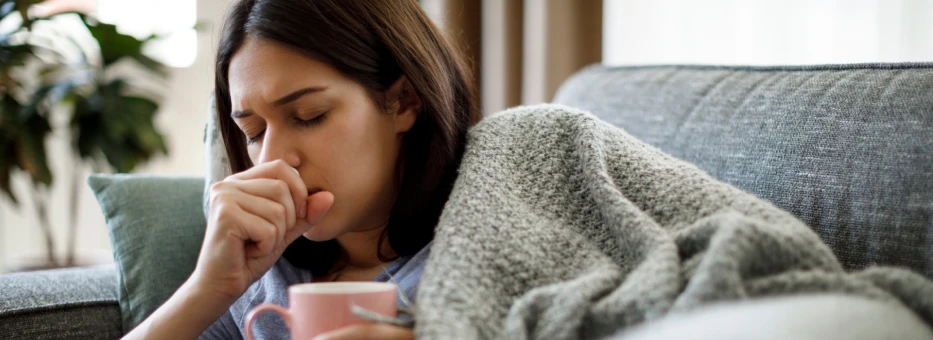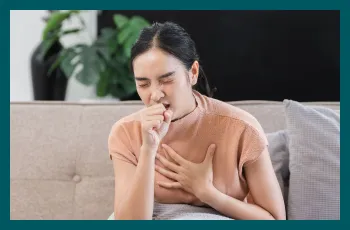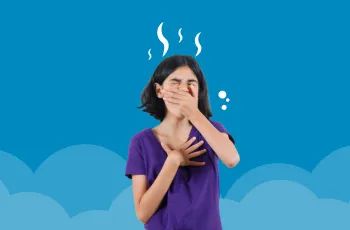Coughing up brown phlegm: Causes & symptoms
Written by the editorial staff writer at Hola. Medically Reviewed by Dr Nelson Lau, MBBS FRACGP, GP & Digital Health Specialist. Dr. Ammar AL-ANI, MBChB, CCBST, AMC. Blog updated on 30 October, 2025. Originally published on 21 March, 2025.

Contents

Overview
Noticing brown phlegm when you cough can be worrying. In many cases, it’s your body clearing out old blood or pollutants like smoke or dust. In Australia, exposure to cigarette smoke, bushfires, and environmental irritants, especially in rural or construction areas, is a common trigger. Here’s what brown phlegm might mean, when to see your GP, and what you can do at home.Is coughing up brown phlegm serious?
Not always. Brown phlegm may result from minor irritants or could indicate a more serious issue, such as a lung infection. Sometimes, brown phlegm is just your lungs getting rid of debris, especially if you’re a smoker or have been exposed to smoke or pollution. But at times it can also signal an infection, inflammation, or even bleeding in the lungs.What does brown phlegm mean?
Mild or common causes
- Smoke or air pollution- common during bushfire season or in smokers
- Dust or workplace exposure- construction, farming, or mining jobs
- Dry throat or dehydration- can make mucus appear dark in colour
- Old blood- caused by a minor nosebleed or irritation in the respiratory tract
- Chronic bronchitis- common in habitual smokers
More serious causes
- Pneumonia- especially if accompanied by fever or chest pain
- Lung abscess- a collection of pus in the lung; mucus may smell bad
- Tuberculosis (TB)- a rare but serious infection; more common in high-risk groups (those with weakened immune systems)
- Chronic lung disease (e.g., COPD)- more common in smokers
- Lung cancer- rare, but possible if coughing up blood-streaked phlegm
Causes
Common causes:- Smoking (active or passive)
- Bushfire or industrial smoke exposure
- Chronic bronchitis
- Environmental dust (e.g., construction sites, rural roads)
- Dehydration
- Lung abscess
- Tuberculosis
- Fungal lung infection
- Lung cancer
- Occupational lung disease (e.g., coal worker’s pneumoniosis)
Symptoms
Mild symptoms:- Chest tightness
- Fatigue
- Wet cough
- Mucus that is brown in the morning and clears later in the day.
- High fever or chills
- Chest pain
- Shortness of breath
- Foul-smelling mucus
- Coughing up blood (pink or red streaks)
- Unexplained weight loss
- Mucus lasting more than 10 days
Home remedies
These remedies may help in mild cases only, but are not a replacement for medical care.- Stay hydrated- Water helps thin mucus
- Avoid smoke- Don’t smoke and avoid smoky spaces
- Warm fluids- Warm tea or soup can help loosen mucus
- Use a humidifier- Moist air can ease your cough
- Get plenty of rest- Let your body rest and recover
How doctors diagnose brown phlegm
Your GP will review your medical history and symptoms. They might recommend some tests, many of which are bulk-billed through Medicare.Common tests:
- Chest X-ray or CT scan- helps detect infections, blockages, or masses.
- Sputum culture- tests your mucus for bacteria, viruses, or fungi.
- Blood tests- examine for signs of infection or inflammation
- Bronchoscopy- a camera test to look inside your lungs to detect tumours, infections, or blockages (done in hospital).
- Pulse oximetry- measures your oxygen levels.
Discuss your imaging needs with a GP. Request a referral from home.
What other colours of mucus mean
The mucous plays a vital role in trapping and clearing irritants from the respiratory system. While clear mucus is normal, colour changes can indicate infections, allergies, or other underlying conditions. Here is a quick guide to what different phlegm colours may suggest:| Colour | What it may mean | When to see a doctor |
| Clear | Normal or mild allergy | Usually not serious |
| White | Cold, mild infection, or congestion | If lasting more than 10 days |
| Yellow | Immune response to infection | If symptoms worsen |
| Green | Possible bacterial infection | See GP if lasting more than 10 days |
| Brown | Smoke, dried blood, or infection | If persistent or recurring |
| Red/Pink | Blood in mucus | See GP urgently |
Contact a doctor
Here’s a simple checklist to help you decide: See a GP if:- Brown mucus lasts more than 10 days
- You have a fever
- You see blood in the mucus
- The mucus smells foul
- You’re losing weight or often feel tired
- You’re struggling to breathe
- You have severe chest pain
- You’re coughing up blood
Getting medical help online
If you’re concerned about persistent brown phlegm, a general practitioner can help determine the underlying cause and recommend treatment options. There’s no need to visit a clinic in person; telehealth consultations are accessible throughout Australia. With Hola Health, you can:- Speak to an Australian-registered GP online
- Get prescriptions, medical certificates, or referrals without leaving home
- Access Medicare rebates (bulk-billed for eligible patients)
Conclusion
Coughing up brown phlegm can be upsetting, but it’s not always serious. Most of the time, your lungs are simply clearing away irritants such as smoke, dust, or old mucus. However, if it persists, worsens, or appears alongside symptoms like fever, chest pain, or blood, you should see a GP. Early check-ups can prevent severe problems.Discuss pathology needs with a GP. Request referral for blood test with Hola.
Providing consult for
- Cough
- Nausea & vomiting
- Fever
- Hayfever
- Fatigue
- Sore throat
- Acne
- Gout
- Eczema
- Rosacea
- Sunburn
- UTI
- Erectile dysfunction
- Contraception
- Morning sickness
- Morning after pill
- Prostate health
- Anxiety
- Depression
- Stress
- Grief & loss
- Premature ejaculation
- Asthma
- Blood pressure
- Diabetes
- Cholesterol
- Migraines & headaches
- Allergies
- Heartburn & reflux
- Sleep disorder
- Gastro
Related Articles
Disclaimer
This blog is for general informational purposes only and does not indicate that Hola Health provides all treatments or preventive measures mentioned. It is not intended to be a substitute for professional medical advice. Always seek the guidance of your doctor or other qualified health professional with any questions you may have regarding your health or a medical condition. For emergencies please immediately contact 000. Any medical topics discussed are intended to educate, not to imply availability through Hola Health.




